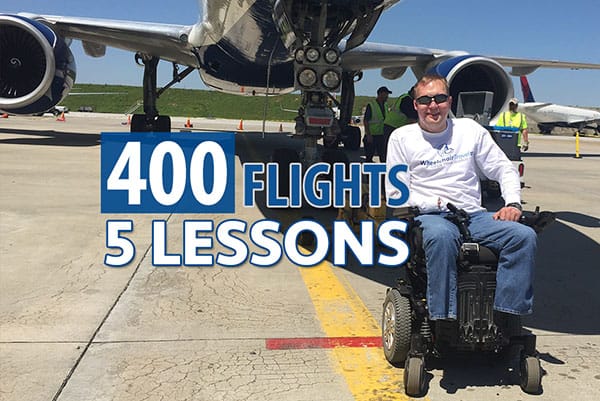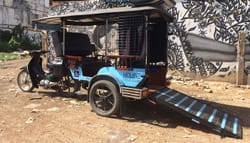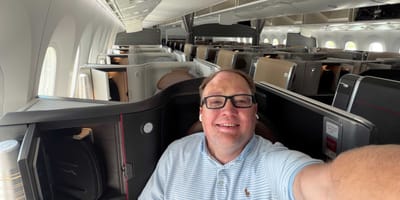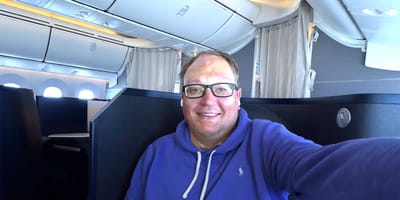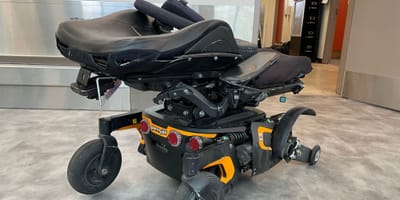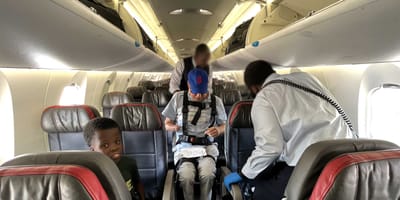Last month, I began an accessible journey around the world – starting in Orlando, Florida. I made stops of varying lengths in Bangkok, Thailand; Phnom Penh, Cambodia; Kuala Lumpur, Malaysia; Berlin, Germany; and Washington, D.C, before returning to a much different Orlando on Thursday.
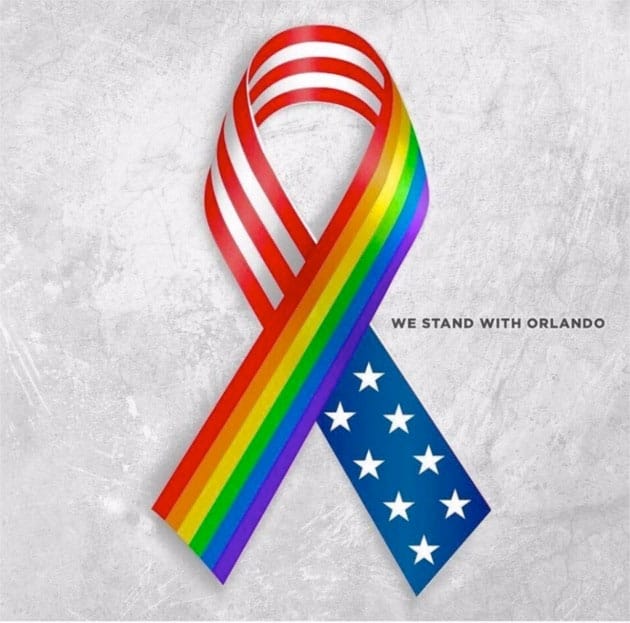
I would like to pause and share my heartfelt sympathy with the victims of the Orlando terror attack, their families and friends, and everyone connected to the city or the gay community. United against hatred and discrimination, we can all stand with the spirit of the #OrlandoStrong movement.
In January 2014, I traveled for the first time with a wheelchair (gained as a result of a 2012 car accident). Some 30 months later (on the day of the Orlando attack), I celebrated a significant milestone in my life as a wheelchair traveler: my 400th flight as a wheelchair user. That was KLM flight 907, service from Amsterdam to Moscow.
You may remember that I have a profound love for KLM, and was a passenger last year on the inaugural flight of their first Boeing 787 Dreamliner. I was happy to share this milestone with the Dutch airline, but am already focused on the lessons from my 405 flights with a disability. I want to share those observations with you.
1. The airlines are not focused (enough) on improving the disability travel experience.
405 flights, and not a single carrier has involved me in their disability planning in any meaningful way. I don’t mean to toot my own horn, but I am not aware of any other full-time wheelchair user who flies on commercial aircraft as frequently as I do.
I have seen every issue that disabled passengers encounter – many times over. The airlines’ response to service failures is always to give me a piddling amount of compensatory miles or future travel dollars. None of the issues I have reported have been addressed, and every violation of my rights that I now encounter is a repeat of a previous service failure. Nothing is new to me anymore, and I am actually surprised when a trip goes smoothly. Those instances – when my rights as a disabled traveler are observed – are an exception to the rule.
If airlines were serious about improving the disability travel experience, they would hire consultants who travel with disabilities (more than once, twice or even ten times per year) to tackle the accessibility issues that plague the industry. For the past 30 months, I have heard only the sound of crickets, and this air travel enthusiast (and longtime ally) is eyeing the position of enemy.
2. The U.S. Department of Transportation does not have my back.
In November 2014, I flew from Tokyo to Bangkok on a U.S. airline. On arrival to Bangkok, my civil rights under the Air Carrier Access Act were violated. I complained, the DOT investigated and determined that the airline had broken the law. No fine was levied.
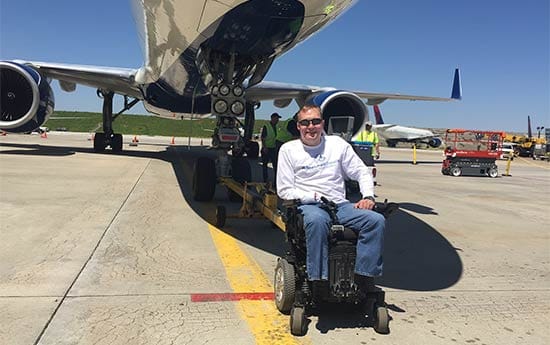
As part of my trip around the world, I again flew the NRT-BKK route on the same airline and experienced the exact same issue on arrival. As an apology, I was given $100 dollars for use on a future flight. I will report the repeat ACAA violation to the DOT, but I suspect they will again do nothing. I am still waiting on a response to a disability complaint filed in January. That particular complaint concerned an obvious violation of the “cut and dried” type.
The ACAA is the only civil rights law in America that denies people the ability to defend their rights in a court of law. The responsibility for protecting my right to equal access in airports and on airplanes lies with the Department of Transportation’s Aviation Consumer Protection Division. They spend more time on delayed baggage complaints than they do on those related to disability and equal access. So much for “consumer protection.”
You can read more about my issues with ACAA enforcement and the protection of our rights as disabled flyers in this blog post: Barriers to Equal Access For Disabled Remain In Air Travel, After 30 Years of DOT Inaction.
3. Investments must be made in training and technology.
Let me share with you a short story. This scenario has played out more than 100 times.
I booked a flight online. I requested assistance on the airline website to board the aircraft using an aisle chair, selecting the “Fully Immobile” checkbox. As a triple amputee, I cannot walk, climb stairs or move without the aid of my power wheelchair.
After booking, I called the airline to confirm these selections were noted, and also notified them of my power wheelchair. Months in advance.
At check-in, I was asked if I needed assistance to board the aircraft. For the third time, I said “yes.”
At the gate, I was asked if I needed assistance to board the aircraft. “Yes” – for the fourth time. The gate agent called for assistance 5 minutes prior to boarding.
The assistance staff did not arrive in time for boarding, and I was denied the opportunity to pre-board the aircraft in privacy and with dignity.
This scenario plays out on many, if not most of my flights. Who is responsible? The airlines say it is the subcontracted assistance team. The company paid by the airline to assist me says they were given too little notice. I was at the gate before my aircraft had even landed at the airport. So, it’s definitely not my fault.
I submit to the airlines that this is both a failure in technology and the training of staff. If a triple amputee rolls up to you in a power wheelchair, why are you asking if I need assistance? I have no legs. And I have informed you of my needs online, on the telephone, and at check-in.
My simple need for a wheelchair to board an aircraft should not be a drawn out public spectacle. But too often, it is. I also know that this is not unique to me, based on the e-mails and comments I receive from readers every day.
4. Every pilot, flight attendant and airport agent should be knowledgeable about the rights & responsibilities contained in the ACAA. Few are.
When I arrived to Orlando on Thursday, I was waiting in the jetway for the return of my wheelchair. The pilot (or co-pilot) came out and said, “They won’t bring that here – you have to receive it at baggage claim or in the terminal.”
Let’s consult the text of the ACAA:
…carriers shall provide for the checking and timely return of passengers’ wheelchairs and other assistive devices as close as possible to the door of the aircraft, so that passengers may use their own equipment to the extent possible, except where this practice would be inconsistent with DOT regulations governing the transportation of hazardous materials.
I (very) kindly informed him of this and he said, “OK, I didn’t know that.” Personally, I believe pilots should be familiar with the rules concerning the carriage of cargo – especially mobility equipment.
5. U.S. airlines (and foreign carriers) ignore the ACAA on international travel.
On my recent around the world trip, I primarily flew internationally and on foreign carriers, on flights that were exempt from the ACAA. But three flights – two on a U.S. carrier and another on a foreign carrier – were subject to the ACAA, and my rights were still violated on all three flights.
The first flight, from Seattle to Tokyo, either did not have an accessible lavatory or the flight attendants were not trained on how to operate it. I thus had to “hold it” for 9 hours in the air, plus the time spent boarding and deplaning.
The second was a flight from Tokyo to Bangkok, in which my wheelchair was not returned to the gate.
The third was from Helsinki to New York, in which my wheelchair was not returned to the gate (and I had to be pushed across my own country’s border in an uncomfortable airport wheelchair following an 8-hour flight).
I will send all three of these violations to the DOT, but again – I expect them to do nothing. Until there is pressure placed on air carriers to adhere to the ACAA when it applies, they will continue to get away with countless violations on their international flights.
Final Thoughts
Air travel is a beautiful thing, and I consider myself to be an aviation geek. I love to fly – it is one of my greatest joys in life. I just wish that it was not such a hassle.
I have a hundred ideas that would improve the air travel experience for people with disabilities, but the airlines have to be willing to listen and implement the recommendations. Until the Department of Transportation takes a stand on behalf of you and me, the airlines have no incentive to invest in accessibility or training.
Equal access to air travel does not exist, and given the burdens it has imposed on me, I can’t believe I’ve done it more than 400 times. With a retiring baby-boomer population and people acquiring new disabilities every day, it’s time for airlines to get serious about treating disabled travelers with the respect and dignity we deserve.

